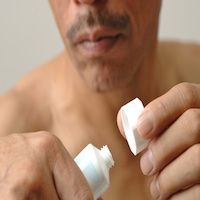Ingredients in Sunscreen Could Trigger Male Infertility
Several ultraviolet (UV)-filtering chemicals typically used in sunscreens can impair the function of human sperm cells, according to new research.

Several ultraviolet (UV)-filtering chemicals typically used in sunscreens can impair the function of human sperm cells, according to new research.
th
The study findings presented at the Endocrine Society’s 98 annual meeting in Boston also found that the same sunscreen chemicals can mirror the effect of the progesterone hormone.
According to Niela Skakkebaek, MD, DMSc, University of Copenhagen, the study results actually shed light on prevalent cases of unexplained infertility.
Research shows that chemical UV filters are usually used to reduce the amount of the sun’s UV rays permeating through the skin.
However, some UV filters are quickly absorbed through the skin — UV filter chemicals have reportedly been found in human blood samples and 95% of urine samples in the US, Denmark, and other countries.
Skakkebaek and team analyzed 29 of the 31 UV filters allowed in sunscreens in the US or the European Union on live, healthy human sperm cells. The researchers focused their study on calcium signaling triggered by changes in calcium ion concentration.
They noted that when the CatSper calcium ion channel is bound to progesterone, a temporary “influx” is triggered - controlling several sperm functions needed for fertilization.
Findings indicated 13 of the 29 UV filters had calcium ion influxes in the sperm cells, which interfered with normal sperm cell function. “This effect began at very low doses of the chemicals, below the levels of some UV filters found in people after whole-body applications of sunscreens.”
Interestingly, nine of the 13 UV filters induced the calcium ion influx by directly activating the CatSper channel, suggesting that these UV filters are endocrine disruptors.
Eight of the 13 UV filters that reportedly affected sperm cell function have already been approved for use in the US: avobenzone, homosalate, meradimate, octisalate, octinoxate, octocrylene, oxybenzone, and padimate O.
Not only are these eight chemicals common ingredients in sunscreens, but they are also active in sunscreen-containing personal care products like makeup, moisturizers, and lip balms.
According to Skakkebaek, “Our study suggests that regulatory agencies should have a closer look at the effects of UV filters on fertility before approval.”